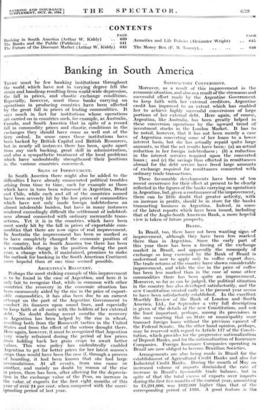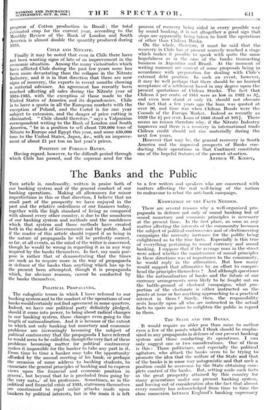Banking in South America
THERE must be few banking institutions throughout the world, which have not in varying degree felt the strain and handicap resulting froM world-wide depression, the fall in prices, and chadtic 'exchange conditions. Especially, however, must those banks carrying on operations in producing countries have been affected by the great fall in prices of leading. commodities. It says much in fact for institutions whose operations are carried on in countries such, for example, as, Australia, • Canada, and South America that in spite of a record fall in commodity prices and chaotic, conditions in the exchanges they should have come so well out of the fiery ordeal. In some cases these institutions have been backed by . British Capital and British Resources, !nit in nearly all instances there has been, quite apart from any such backing, great skill in administration, and also a sympathetic treatment of the local problems which have undoubtedly "strengthened'their positions in the various countries concerned.
SIGNS OF IMPROVEMENT.
In South America there might also be added to the difficulties I have already enumerated political troubles arising from time to time, such for example as those which have in turn been witnessed in Argentina, Brazil and Chile, while each and all of the countries named have been .severely hit by the low prices of commodities which have not only made foreign indebtedness an almost intolerable burden, but have in many instances rendered exceedingly difficult the settlement of indebted- ness abroad connected with ordinary mercantile trans- actions. .Yet it is in the countries., which have been most sorely hit by the fall in 'prices of eiportable com- modities that there are now signs of real improvement. In Australia the improvement has been so marked as to have completely changed the economic position of the country, but in South America too there has been a remarkable change in the position during the _past year, a `change which,' if maintained, promises to make the outlook for banking in the South American Continent more hOpeful than at one time seemed possible.
ARGENTINA'S RECOVERY.
Perhaps the most striking example of this improvement is to be found in the case of Argentina, and here-- it is only fair, to recognize that, while in common with other countries. the recovery in the economic situation has been enormously aided by the risc hi the price of export- able commodities, it has also been due to an earnest attempt fon the part of . the Argentine GoVernment to conduct its finances upon sound lines, and especially to keep faith at all costs with the holders-of her external debt. No doubt during recent months the recovery in Argentina has been helped by the rise in. wheat, resulting both from the Roosevelt tactics in the United States and from the effect of the serious drought there. Here again, however, it must be recognized that Argentina very wisely refrained during the period of low prices from holding back her grain crops to await better values. This wise policy has undoubtedly enabled Argentina to get far better prices for her latest season's crops than would have been the case if, through a process of hoarding, it had been known that she had large accumulations. At all events, from one cause or another, and mainly no doubt by reason of.. tfie rise in prices, there has been, after allowing for the deprecia- tion in the exchange value of the Peso, an increase in the value, of exports for the .first eight„inontlis of this year of over 24 per eent.'When'coMpared with the correl sponding period of last year.
SATISFACTORY CONVERSIONS.
Moreover, as a result of this improvement in the economic situation, and also as a result of the strenuous and successful effort made by the Argentine Government to keep faith with her external creditors, Argentine credit has improved to an extent_ which has enabled her to achieve highly successful conversions of large portions of her external debt. Here again, of course, Argentina, like Australia, has been greatly helped in these conversion operations by the upward trend of investment stocks in the London Market. It has to.
be noted, however, that it has not been merely a case' of Argentina converting some of her loans to a lower. interest basis, but she has actually repaid quite large' amounts, so that the net results have been: (a) an actual. reduction in her foreign indebtedness ; (b) a reduction in the interest services required upon the converted. loans ' • and (c) the savings thus effected in remittances abroad for the debt service have freed large amounts of exchange required for remittances connected with; ordinary trade transactions.
These favourable developments have been of toe recent occurrence for their effect at present to be clearly reflected in the figures of the banks carrying on operationS: in Argentina, but, given a continuance of the improvement there can be little doubt that greater activity, with an increase in profits, should be in store for the bankS, transacting business in Argentina. Indeed, in some of the latest reports which have been issued, including that of the Anglo-South American Bank, a more hopeful view is taken of future prospects.
BRAZIL.
In Brazil, too, there have not been wanting signs of improvement, although they have been less marked there than in Argentina. Since the early part of this year there has been a freeing of the exchange market in Brazil, and apparently :the monopoly of exchange so long exercised by the Bank of Brazil is understood now to apply only to coffee export dues. The trade returns of the country have shown considerable improvement, and while the rise in the price of 'coffee has been less marked than in the case of some other commodities there has been quite an improvement. Moreover; so far as can be judged, the political situation in the country has also developed satisfactorily, and the new tonstitution'created early in the present year seems to have been satisfactorily established. In the excellent Monthly Review of the Bank of London and t. South America, Ltd., for September a_ vely full description is given of the details of the new Constitution, and not the least important, perhaps, among its provisions is the one enacting that no State or municipality may transact foreign loans without the previous cinscnt of the Federal Senate. On the other hand opinion, perhaps, may be reserved with regard to Article 117 of the Consti- tution, which provides for the progressive nationalization of Deposit Banks, and for the nationalization of Insurance Companies. Foreign Insurance Companies operating in Brazil are now obliged to become Brazilian Societies.
Arrangements are also being made in Brazil for the establishment of Agricultural Credit Banks and also for Industrial Credit Banks. During the month of May an increased volume of imports diminished the rate of increase in Brazil's favourable trade balance, but in spite of that the total excess of exports over imports during the first five months of the current year, amounting to £4,291,000, was £832,000 higher than that of the corresponding period of 1938. A good feature is the progress of Cotton production in Brazil ; the total estimated crop for the current year, according to the Monthly Review of the Bank of London and South America is almost- double the quantity produced during 1933.
CHILE AND NITRATE.
Finally it may be noted that- even in Chile there have not been wanting signs of late of an improvement in the economic situation. Among the many vicissitudes which have afflicted Chile during the past few years none has been more devastating than the collapse in the Nitrate Industry, and it is in that direction that there are now signs of recovery, the exports in recent months showing a material advance. An agreement has recently been reached- affecting all sales during the Nitrate year of 1934-1935, with the exception of those made to the United States of America and its dependencies. Chile is to have a quota in all the European markets with the exception of Poland, and the Cartel is for one year subject to extension, and the danger of price cutting is eliminated. " Chile should therefore," says a Valparaiso correspondent writing to the Bank of London and South America, " be in a position to sell about 720,000 tons of Nitrate to Europe and Egypt this year, and some 450,000 tons to .the United States, Japan, &c., with an improve- ment of about I1 per ton on last year's prices.
POSITION OF FOREIGN BANKS.
Having regard, however, to the difficult period through which Chile has passed, and the supreme need for the process of recovery being aided in every possible way by sound banking, it is not altogether a good sign that steps are apparently being taken to limit the operations of other than Chilean Banks.
On the whole, therefore, 'it must be said that the recovery in Chile has at present scarcely reached a stage which makes it possible to speak with quite the same hopefulness as in the case of the banks transacting business in Argentina and Brazil. At the moment of writing rumours are current of some proposals being in accordance with preparation for dealing with Chile's external debt position. In such an event, however, it may be well perhaps that there should be no hurried acceptance of a settlement based in any deg. ree upon the present quotations of Chilean Stocks. The fact that Chilean 5 per cents. of 1911 were as low -in 1932 as 51, and even now stand at only 24, , should not obscure the fact that a few years ago the loan was quoted at over 90, and time was when Chilean Bonds were the Consols of the Foreign Market. Indeed as recently as 1929 the 4f per cent. Loan of 1886 stood at 101g. There seems no reason therefore why, if • the Nitrate Industry improves and there is a recovery in international trade Chilean credit should not rise materially during the next few years. .
However that may be, the general recovery in South America and the improved prospects of Banks Om- ducting their eperations in that Continent constitute one of hopeful features of the present situation. '
ARTHUR W. KIDDY/























































 Previous page
Previous page